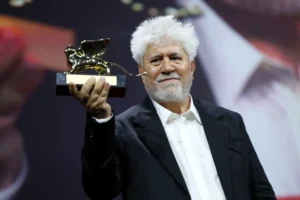The 2024 Venice Film Festival has concluded, showcasing a compelling mix of cinematic innovations and industry shifts. As the festival wraps up, Mogul Productions Head of Development, Randy Charach, Head of Film Production James Pratt, and CEO Matt Gigault share their insights from this year’s La Biennale.

1. Almodóvar’s Landmark Victory
Pedro Almodóvar has achieved a career milestone with his film The Room Next Door, which won the Golden Lion. The film, featuring Tilda Swinton as a dying war photographer who chooses euthanasia, received mixed reviews but has generated significant buzz in awards circuits. With Sony Pictures Classics on board, the film is now a serious Oscar contender.
2. TV’s Growing Influence at Film Festivals
The lines between television and cinema continue to blur. Alfonso Cuarón’s Disclaimer, a limited series starring Cate Blanchett and Kevin Kline, was treated with the same importance as a major film premiere.
Mogul Head of Development, Randy Charach, noted, “The quality of TV keeps getting better. Ten years ago, TV actors were considered less appealing due to lower budgets. Today, we see film actors actively seeking TV roles, reflecting the medium’s rising prestige.”
3. Venice’s Self-Referential Trend
This year’s festival highlighted a curious trend: several films referenced Venice within their narratives. From Angelina Jolie’s character in Maria reminiscing about the city to The Brutalist incorporating local scenery, Venice itself became a thematic element. This self-referential approach underscores the city’s unique position in the cinematic world.
4. Changes in Festival Press and Promotion
The traditional press junket model was less prominent this year, with major films like The Brutalist and The Order receiving minimal media exposure. Instead, the festival focused on high-profile premieres and international media coverage.
James Pratt Head of Film Production at Mogul Productions observed, “We saw this shift at other major festivals earlier this year as well. As international film audiences grow, promotion is increasingly geared
toward a broader audience rather than just one region.”
5. Awards Buzz and Oscar Contenders
Venice set the stage for the awards season, though its impact on the Oscars remains nuanced. The festival highlighted several Best Actress contenders, such as Angelina Jolie and Nicole Kidman, but did not produce clear Best Picture frontrunners. The unexpected acclaim for The Brutalist suggests it could become a serious Oscar contender, despite its lengthy runtime.
6. The Return of Explicit Content
Venice reintroduced explicit content to the big screen with films like Luca Guadagnino’s Queer and Halina Reijn’s Babygirl. These films featured provocative scenes, igniting discussions about the role of sexuality in cinema.
“The R-rated audience has always been there as it’s one of the most lucrative audiences, however of recent studios have been reluctant to take too much riss due to the cancel culture push and political climate, Gigault remarked. “However, with successes like Deadpool and Wolverine smashing box office records in 2024, we’re seeing a surge in explicit content both in action and more provocative films.”
7. The Lengthy Film Trend
Long runtimes were notable at Venice, with several films, including Brady Corbet’s The Brutalist, extending beyond two hours. This trend raises questions about audience tolerance for extended cinematic experiences and reflects an ongoing debate about balancing artistic ambition with viewer engagement.
8. Shifts in Distribution Practices
The distribution landscape has evolved, with major deals for films like Maria and Queer secured before the festival began. High-profile acquisitions now occur more strategically, reflecting a shift away from the traditional festival frenzy for instant deals. This change indicates a more measured approach to film distribution and promotion in today’s market.

